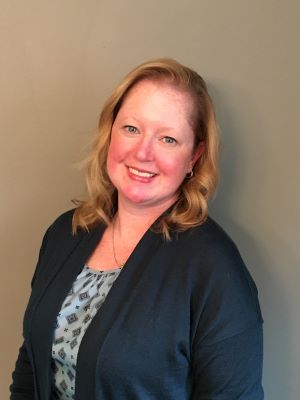
Kristina (Koesters) Stein
PHYSICAL THERAPY
Graduated in 2003
Physical Therapist & Residency Coordinator
Henry Ford Hospital and New Center One
Q: Why did you choose Wayne State University?
A: Wayne State had a good reputation for physical therapy, was close to my home, and offered me a great opportunity with a Presidential Scholarship.
Q: What inspired you to pursue Physical Therapy?
A: As an athlete, I had an injury that required therapy. I was so interested in how she was able to read the signs and symptoms of my body and use her knowledge and skills to get me back out on the ice. I was very grateful to her and felt that I would enjoy working with others in a similar way.
Q: Who was your most memorable Professor?
A: Chris Carlson was very memorable. She held us to a high standard but also demonstrated such kindness when anyone was struggling. She was constantly professional and clearly loved being a physical therapist; I can't imagine her being anything else.
Q: What was your most challenging class?
A: Cardio-pulm was a struggle for me! I thought I was going to work with athletes, and that the content wasn't going to be especially relevant to me; fairly ironic since I work almost exclusively in ICUs now.
Q: Where was your favorite place to study?
A: The old, plaid couch! (The one Fredrick wouldn't let us bring to the new building)
Q: Share some reflections about your time at Wayne State:
A: I was so fortunate to have great friends in physical therapy school. We were able to support and encourage each other and I am still close friends with many of them over 20 years later. During our 2nd year, I spent ~3 months living in Utah to perform at the 2002 Winter Olympics, and my classmates are truly the only reason I was able to complete my coursework. They would send me packets of notes every week and run me through mobilizations and labs when I returned home (there was no Zoom back then). My professors also worked with me to create an action plan to allow me to have that opportunity, knowing full well that I would still be held to the same standard as my classmates. The sense of community was very strong, and I am still grateful for that.
Q: In your opinion, what is one of the biggest changes that has occurred in your profession since graduating?
A: I'm proud to say that the intensity and acuity of the patient we work with has changed greatly. When I first started in acute care, we did work in the ICUs, but only when consulted by a physician and it was limited and conservative. Now we have standing orders on our ICU patients, and we decide when they are stable/ready for our intervention, and we work with them daily. It is not uncommon to mobilize patients on ventilators or with multiple invasive lines. The difference we see in the outcomes is incredible!
Q: Share a career highlight or summary:
A: Developing the acute care residency program at Henry Ford Hospital. This was the first acute care program in Michigan and the first residency for our health system.
Physical therapists are dynamic health professionals who develop, coordinate and utilize select knowledge, skills and techniques in planning, organizing and directing programs for the care of individuals whose ability to function is impaired or threatened by disease or injury. The goal of PT is to enhance a person’s quality of life and their ability to participate in activities. The Doctor of Physical Therapy program application process opens July 1 and the deadline is Oct. 15. WSU Applebaum information meetings for prospective students take place at 6 p.m. on the first Tuesday of each month.
An anchor in urban health care
The Eugene Applebaum College of Pharmacy and Health Sciences is built on more than 100 years of tradition and innovation in the heart of Detroit. We have grown deep roots in our city, harnessing its powerhouse hospital systems and community service organizations as vibrant, real-world training grounds for students, with an ongoing focus on social justice in health care. And our research at all levels – from undergraduates to veteran faculty members – translates into creative solutions for healthier communities.
Wayne State University is a premier urban research institution offering approximately 350 academic programs through 13 schools and colleges to nearly 24,000 students.